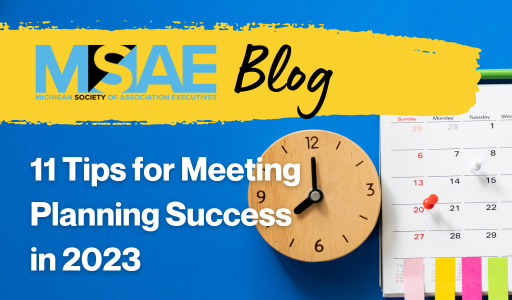
Associations and meeting venues are doing business in an environment of unprecedented change and challenge, which can create tension in our business relationships and have a negative impact on our attendees' experience. At the recent Michigan Event Industry Day hosted by MMPI- Michigan Chapter, Kim Corcoran of Destination Michigan shared strategies to preserve the relationship and ensure good outcomes for associations and venues. Kim's presentation stimulated additional helpful tips from attendees.
Here are eleven tips for meeting planning success in 2023 that surfaced during Kim's session:
- Prepare your association and members now for price increases. Venue costs have increased dramatically, so association meeting costs are also increasing. Associations should seriously consider adjusting registration fees accordingly.
- Flexibility on meeting dates and locations will provide associations with more venue and pricing options.
- Utilize the expertise of Convention and Visitors Bureaus to help you source venues and establish realistic timelines.
- Do not rely on pre-COVID attendance for contract numbers - instead, use current participation numbers and member data for forecasting.
- Be conservative in your contracted numbers and have a Plan B in place in case you go over your anticipated block – either at the primary venue or overflow venues.
- Make use of contract addendums and block adjustment clauses that allow for adjustments 9/6/3 months out.
- Note the required response date on proposals and respond accordingly to avoid losing your meeting space.
- Schedule calendar reminders for critical dates, such as proposal deadlines, block adjustments, and meal counts.
- Keep room sets the same whenever possible.
- Ask about meal service options that are less expensive and/or less labor intensive.
- Allow more time for all touchpoints with venues.
Incorporating these tips into your planning practice now will help maintain positive relationships with our venue partners and ensure good outcomes for associations and our meeting participants later.
|
|
|
|
|
|
|
|
|
|
|
|
|
|
|
|
|
|
|
|














